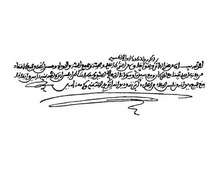Yusuf Karamanli
Yusuf (ibn Ali) Karamanli, Caramanli or Qaramanli or al-Qaramanli (most commonly Yusuf Karamanli), (1766 – 1838) was the best-known Pasha (reigned 1795–1832) of the Karamanli dynasty (1711–1835) of Tripolitania (in present-day Libya).
| Yusuf Karamanli | |
|---|---|
| Pasha of Tripoli | |
| Reign | 11 June 1795 – 20 August 1832[1] |
| Predecessor | Ali II Burghul Pasha Cezayrli (usuper) |
| Successor | Ali II |
| Born | 1766 Tripoli, Ottoman Tripolitania |
| Died | 1838 (aged 72) |
| Dynasty | Karamanli Dynasty |
| Father | Ali I |
| Religion | Islam |
Assumption of the throne
Born in Tripoli in 1766, Karamanli, a member of the Karamanli dynasty (named after the Karamanids in Turkey), was originally of Turkish origin.[2] His brother, Hamet Karamanli, was deposed in 1793 by Ottoman Empire officer Ali Benghul; Benghul proceeded to restore Ottoman rule over Tripoli. In 1795 Yusuf returned to Tripoli, and with the aid of Hammuda Pacha (ruler) of neighboring Barbary state of Tunis, seized the throne, exiling Hamet to Alexandria, Egypt and restoring Karamanli rule.
Barbary Wars

In 1796, Yusuf drafted and signed the Treaty of Tripoli.[4]
In 1801, Yusuf demanded a tribute of $225,000 from third American President Thomas Jefferson (1743-1826, served 1801-1809), Jefferson, confident in the ability of the new United States Navy (revived 1794, with the building of six heavy frigates beginning in 1797) to protect American shipping, refused the Pasha's demands, leading the Pasha to unofficially declare war in May 1801 by chopping down the flagpole with the American flag before the U.S. consulate.
The U.S. Navy attempted to blockade Tripoli's harbors with a squadron sent by President Jefferson in 1803. After some initial military successes, most notably the capture of the grounded American frigate USS Philadelphia in October 1803, the pasha soon found himself threatened after the daring raid led by Lt. Stephen Decatur, USN, (1779-1820), to burn and scuttle the Philadelphia in Tripoli harbor, the following February 1804, then with facing invasion by American Marines and mercenary ground forces following the Battle of Derna in April 1805 to the east and the reinstatement of his deposed brother, Hamet Karamanli, recruited by the American army officer and diplomatic consul William Eaton (1764-1811). He signed a treaty with American emissary Tobias Lear (1762-1816), from the U.S. Department of State ending the war on June 10, 1805.
On 5 September 1817, Yusuf Karamanli invited the leaders of Libyan tribe of Al-Jawazi to his castle in Benghazi, following a dispute regrading tribute and uprising against his rule. Consequently, the Pasha ordered the execution of all attendees and chasing down the other tribe members which resulted in massacring at least 10,000 people, who eventually sought refuge in the neighboring countries, especially in Egypt.[5][6]
Decline of the Karamanli (Caramanli) dynasty
By 1819, the various treaties of the Napoleonic Wars had forced the Barbary states to give up corsair activity almost entirely, and Tripoli's economy began to crumble. Yusuf attempted to compensate for lost revenue by encouraging the trans-Saharan trade, but with abolitionist sentiment on the rise in Europe and to a lesser degree the United States, this failed to salvage Tripoli's economy. As Yusuf weakened, factions sprung up around his three sons; though Yusuf abdicated in 1832 in favor of his son Ali II, civil war soon resulted. Ottoman Sultan Mahmud II in Istanbul sent in troops ostensibly to restore order, but instead deposed and exiled Ali II, marking the end of both the Karamanli dynasty and an independent Tripoli.
References
- http://www.chiefacoins.com/Database/Countries/Libya.htm
- Fredriksen 2001, 265.
- Treaties and other international acts of the United States of America /. Washington, D.C. 1931–1948. hdl:2027/uiug.30112104106221.
- "Avalon Project - The Barbary Treaties 1786-1816 - Treaty of Peace and Friendship, Signed at Tripoli November 4, 1796". avalon.law.yale.edu. Retrieved 2018-11-08.
- "Libyan tribe demands to prosecute Turkey for the massacres committed against its people, similar to that of the Armenians". horizonweekly.ca. 5 October 2016.
- مذبحة الجوازي.. دماء 10 آلاف ليبي تطارد إردوغان. 3thmanly.com/ (in Arabic). 18 October 2018.
Notes
- ^ Hume 311.
- ^ US Country Studies
Bibliography
- Fredriksen, John C. (2001), "Karamanli, Yusuf", America's Military Adversaries: From Colonial Times to the Present, ABC-CLIO, ISBN 1-57607-603-2.
References
- Folayan, Kola Tripoli during the reign of Yusuf Pasha Qaramanli. Ife, Nigeria: University of Ife Press, 1979.
- Hume, L. J. "Preparations for Civil War in Tripoli in the 1820s: Ali Karamanli, Hassuna D'Ghies and Jeremy Bentham." The Journal of African History 21.3 (1980): 311-322.
- London, Joshua E. Victory in Tripoli: How America's War with the Barbary Pirates Established the U.S. Navy and Shaped a Nation. New Jersey: John Wiley & Sons, Inc., 2005. ISBN 0-471-44415-4
- McLachlan, K. S. "Tripoli and Tripolitania: Conflict and Cohesion during the Period of the Barbary Corsairs (1551-1850)." Transactions of the Institute of British Geographers, New Series 3.3 (1978): 285-294.
Books
- LAFI (Nora), Une ville du Maghreb entre ancien régime et réformes ottomanes. Genèse des institutions municipales à Tripoli de Barbarie (1795-1911), Paris, L'Harmattan, 2002, 305 p.
External links
| Preceded by Ahmad II Pasha |
Pasha of Tripoli 1795-1832 |
Succeeded by ??? |